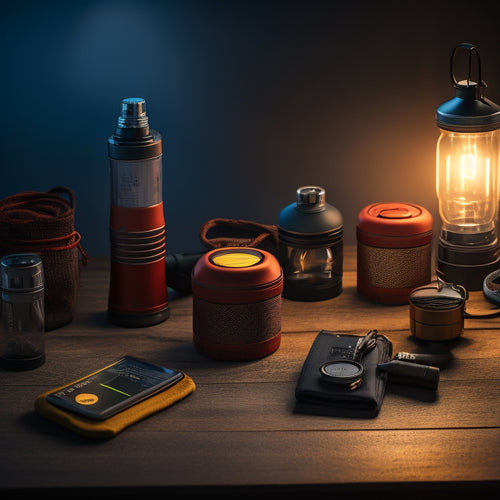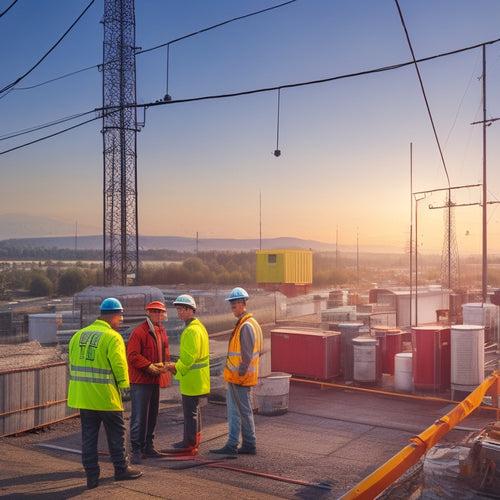
Solar Battery Backup for House
Share
You're considering a solar battery backup system for your house, which means you're taking an essential step towards energy independence and minimizing the impact of power outages on your daily life. A reliable solar battery backup system guarantees your essential appliances and lights remain operational during blackouts, providing a seamless integration with your solar panels. You'll enjoy nighttime energy independence with silent power assurance, without the noise pollution associated with generators. By understanding your watt-hour capacity ratings and selecting the right battery chemistry, you'll be able to optimize your energy storage and prolong battery lifespan. Now, learn how to maximize your system's potential.
The Essentials
- Solar battery backup systems provide reliable energy storage during blackouts, ensuring essential appliances and lights remain operational.
- Correctly sizing the battery bank by identifying essential appliances and their wattage ratings is crucial for outage planning and adequate coverage.
- Lithium-ion batteries offer higher performance, longer lifespan, and lower environmental impact, making them a popular choice for solar battery backup systems.
- Maintaining optimal depth of discharge and implementing a controlled charging environment can prolong battery life and reduce degradation rates.
- Policy incentives can help offset the cost of solar installations, making solar battery backup systems more accessible and cost-effective for homeowners.
Reliable Power During Outages
You're likely no stranger to power outages, which can be frustrating and even dangerous.
With a solar battery backup system, you can guarantee you have a reliable source of energy storage solutions during blackouts.
By providing a reliable source of backup power, you can keep your essential appliances and lights running even when the grid goes down Reliable Electricity Supply.
This means you'll have power when you need it most, keeping your lights on, refrigerator running, and critical systems operational.
Energy Storage Solutions
Around 70% of households experience at least one power outage annually, highlighting the need for reliable energy storage solutions.
You're likely no stranger to the frustration and inconvenience that comes with losing power. That's why you're considering a solar battery backup system for your house.
With traditional solar panels, excess energy is often wasted due to a lack of effective storage options off grid systems, but a battery backup system can change that.
When it comes to energy storage solutions, you want a system that seamlessly integrates with your solar panels to maximize solar efficiency.
A well-designed system should prioritize renewable integration, ensuring that your home remains powered by clean energy even when the grid is down.
A battery backup system allows you to store excess energy generated by your solar panels during the day for use at night or during power outages.
This means you can enjoy uninterrupted power, even when the grid is down.
With a dependable energy storage solution, you can rest assured that your home will remain powered, keeping your family safe and comfortable.
Power During Blackouts
Most households experience at least one power outage annually, and many of these outages occur during the most inopportune times, such as extreme weather events or peak usage hours. You're left in the dark, literally, without access to essential appliances like refrigerators, medical equipment, and communication devices. A solar battery backup system provides reliable power during outages, ensuring your family's safety and comfort.
| Outage Scenario | Without Backup | With Solar Backup |
|---|---|---|
| Refrigerator Failure | Spoiled food, financial loss | Food stays fresh, no losses |
| Medical Equipment Failure | Health risks, emergency situations | Continuous operation, peace of mind |
| Communication Disruption | Isolation, lack of information | Stay connected, receive updates |
Silent Operation at Night
You expect your solar battery backup system to provide nighttime energy independence, allowing you to power your home without relying on the grid after dark.
With deep cycle batteries, you can store excess energy generated during the day for use at night, reducing your reliance on the grid and lowering your energy bills renewable energy storage.
This means you can enjoy the comforts of modern living without the noise pollution of a generator.
With a silent operation feature, you can rest assured that your backup system will provide quiet power assurance when you need it most.
Nighttime Energy Independence
Frequently, homeowners who invest in solar battery backup systems prioritize nighttime energy independence, which guarantees silent operation at night. This means you can enjoy the peace and quiet of your home without the hum of a generator or the grid's constant buzz.
With a solar battery backup system, you're not reliant on the grid to power your essential appliances during the night. You're in control, with the freedom to choose how you want to use your energy.
Achieving nighttime energy independence is a key aspect of solar autonomy. It's about having the energy resilience to power your home, even when the sun isn't shining.
Your solar panels charge your batteries during the day, and at night, your batteries take over, providing a seamless shift to backup power. This guarantees your home remains comfortable, safe, and functional, even during extended grid outages.
Quiet Power Assurance
The solar battery backup system's quiet operation at night is a significant advantage, particularly for homeowners who value a peaceful living environment. You won't be disturbed by noisy generators or humming machinery, allowing you to enjoy the benefits of energy independence without compromising your quality of life.
This quiet operation is made possible by the system's advanced technology, which guarantees seamless grid integration and efficient energy storage. As a result, you can enjoy cost savings and reduced environmental impact, all while benefiting from the latest advancements in solar efficiency.
When installing your system, be certain to follow proper installation tips and maintenance practices to achieve peak performance. Additionally, look into policy incentives that may be available to you, which can help offset the cost of your system.
With a compatible system, you can rest assured that you'll have reliable power when you need it most, without disturbing the peace.
Deep Cycle Battery Design
You'll need to evaluate two critical aspects of deep cycle battery design for your solar battery backup system: the battery cell chemistry and cycle life expectancy.
The chemistry you choose will impact the battery's overall performance, durability, and cost. When selecting a deep cycle battery, it's important to take into account the type of solar power system you have, as well as your energy storage needs.
Battery Cell Chemistry
Across various deep cycle battery designs, the choice of battery cell chemistry plays a vital part in determining the overall performance, lifespan, and cost of your solar battery backup system. You have two primary options: lithium-ion and lead-acid batteries.
Lithium-ion batteries offer several advantages, including higher battery performance, longer lifespan, and lower maintenance practices. They also have a lower environmental impact due to their recyclable nature and reduced material usage.
In contrast, lead-acid batteries are more cost-effective upfront but have lower charging efficiency and require more maintenance. They also have a larger environmental footprint due to their heavier weight and non-recyclable materials.
When it comes to thermal management, lithium-ion batteries are more sensitive to temperature fluctuations, while lead-acid batteries are more sturdy.
Considering cost, lithium-ion batteries may be more expensive initially, but their longer lifespan and reduced maintenance needs make them a more cost-effective option in the long run.
Ultimately, you must weigh these factors to choose the best battery cell chemistry for your solar battery backup system, ensuring you achieve the freedom and energy independence you desire.
Cycle Life Expectancy
When selecting a deep cycle battery design for your solar battery backup system, cycle life expectancy is a critical factor to evaluate, as it directly impacts the overall lifespan and reliability of your system. You want to guarantee that your batteries can withstand the demands of your energy needs while maintaining their performance over time.
Cycle life expectancy is influenced by several factors, including:
| Lifespan Factors | Description | Impact on Cycle Life |
|---|---|---|
| Cycle Management | Correct charging/discharging practices | High |
| Maintenance Practices | Regular monitoring and maintenance | Medium |
| Degradation Rates | Chemical reaction affecting capacity | Low |
| Usage Patterns | Depth of discharge and frequency | High |
| Temperature Effects | Operating temperature range | Medium |
Consider Watt-Hour Capacity Ratings
When sizing a solar battery backup for your house, you'll need to take into account your backup power needs and calculate the required watt-hour capacity rating.
This is vital for ensuring a continuous energy supply during extended grid failures or severe weather conditions, much like what renewable energy systems provide.
This involves identifying the essential appliances you want to power during an outage and determining their total energy consumption.
To get an accurate calculation, you'll want to factor in the duration of the backup period and the desired depth of discharge for your batteries.
Backup Power Needs
Determining your backup power needs is essential for selecting the right solar battery backup system for your house. You need to evaluate the energy consumption patterns of your household during a power outage. This involves identifying the essential appliances and devices you want to keep running, such as refrigerators, lights, and medical equipment.
To get started, make a list of the devices you want to power during an outage, along with their wattage ratings. Then, estimate the number of hours you want to run these devices on backup power. This will help you determine the required watt-hour capacity of your solar battery backup system.
Here is a sample load management plan to help you get started:
| Appliance | Wattage | Runtime (hours) | Total Watt-hours |
|---|---|---|---|
| Refrigerator | 150 | 8 | 1200 |
| LED Lights (5) | 10 | 8 | 400 |
| Laptop | 65 | 4 | 260 |
| Medical Equipment | 100 | 8 | 800 |
Capacity Calculation Tips
A minimum of 2,660 watt-hours of backup power is required to support the sample load management plan outlined above.
To determine the ideal capacity for your solar battery backup system, you'll need to take into account your energy consumption analysis and solar panel integration.
When calculating the capacity, take into account the watt-hour capacity ratings of the batteries you're using. You'll want to verify you have enough capacity to cover your essential loads during an extended grid outage.
A general rule of thumb is to oversize your battery bank by 10-20% to account for inefficiencies and unexpected energy usage.
When selecting batteries, look for those with high depth-of-discharge (DOD) ratings, as they'll provide more usable capacity.
Additionally, take into account the round-trip efficiency of the batteries, which affects how much energy is lost during charging and discharging.
Longer Lifespan Guarantee
When selecting a solar battery backup for your house, you'll want to prioritize battery durability, as it directly impacts the system's overall lifespan.
A longer lifespan guarantee guarantees you'll get the most out of your investment, with some top-tier batteries offering up to 10-year warranties.
Battery Durability Matters
Several factors contribute to a solar battery backup system's overall performance, but few are as critical as the durability of its batteries. You want a battery that can withstand the demands of daily use and provide a reliable source of power when you need it most.
A battery with a longer lifespan guarantee guarantees you get the most out of your investment and minimizes the need for frequent replacements.
When evaluating battery durability, look for manufacturers that provide detailed specifications on their products' expected lifespan, cycle life, and depth of discharge. These metrics will give you a clear understanding of the battery's performance optimization capabilities.
Additionally, consider battery maintenance tips, such as monitoring temperature, controlling charge rates, and avoiding deep discharges, to further extend the battery's lifespan.
Frequently Asked Questions
Can I Use My Existing Solar Panels With a Solar Battery Backup?
You can likely use your existing solar panels with a solar battery backup, but you'll need to verify solar panel compatibility and optimize battery efficiency by checking their voltage, ampere, and wattage ratings to guarantee a seamless integration.
Will a Solar Battery Backup Work During a Grid Outage at Night?
Imagine a lighthouse signal in a dark storm; that's you, self-sufficient during a grid outage at night. With a solar battery backup, you'll enjoy night power, thanks to stored energy from the sun, ensuring outage reliability and freedom from the grid's whims.
How Do I Monitor the Status of My Solar Battery Backup System?
You can monitor your battery's status through battery management systems, which often come with monitoring apps, allowing you to track performance, charge levels, and grid connectivity in real-time, giving you full control and visibility over your energy independence.
Are Solar Battery Backups Compatible With My Home's Electrical Panel?
You'll need to verify your solar battery backup meets your home's installation requirements, checking electrical compatibility by assessing the panel's voltage, amps, and wiring configuration to confirm a safe and efficient integration.
Can I Add More Batteries to My Solar Battery Backup System Later?
You can expand your system's battery capacity as needed, thanks to flexible expansion options that allow you to add more batteries later, giving you the freedom to increase your energy independence without being locked into a fixed system.
Final Thoughts
You've got reliable power during outages, silent operation at night, and a deep cycle battery design that's built to last. When choosing a solar battery backup for your house, consider watt-hour capacity ratings to guarantee you've got enough juice to keep your essentials running. And with a longer lifespan promise, you can rest easy knowing your backup system is as steady as a rock, providing a guiding light in the darkness of an outage, shining bright like a lighthouse on a stormy night.
Related Posts
-

Best Solar Powered Flashlights for Emergency Situations
When you're choosing the best solar-powered flashlights for emergency situations, focus on their brightness, battery ...
-

Advantages of Solar Generating Systems Over Traditional Energy
Solar generating systems provide several key advantages over traditional energy sources. You'll experience lower long...
-

Smart Grid Technology Implementation Challenges
You'll encounter several challenges when implementing smart grid technology, particularly in cost management, scalabi...


